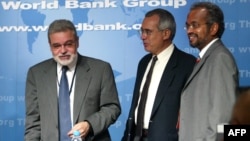NAIROBI —
The World Bank says a lack of good jobs for an increasing number of young people in sub-Saharan Africa threatens the continent’s recent economic growth. The Bank says sustainable economic development is key to the continent’s future success.
The World Bank says rising exports and increased domestic demand will continue to lift the economies of sub-Saharan Africa through the rest of the year. The region is expected to post economic growth of around 5.2 percent in 2012 and to continue to grow next year.
In a live webcast Thursday, World Bank Chief Economist for Africa Shanta Devarajan said one of Africa’s greatest assets for future economic growth is the number of young people entering the work force.
“Africa may be the only source of young people very soon, because the rest of the world is aging and some of the world, including Europe and Japan and the U.S. are aging quite rapidly," said Devarajan. "So this is potentially -- Africa could be a great powerhouse in the future.”
But Devarajan said a growing population of young people is a “double-edged sword” and, if not managed right, could actually threaten economic development.
“The most important risk or the most important threat is the fact that despite all of this growth, the number of productive jobs being created as a result of growth is still very limited relative to the number of young people entering the labor force every year,” he added.
The World Bank says the natural resource sector across the region also carries great promise but risks burdening countries with the so-called “resource curse,” when revenues from natural resources fail to improve the lives of average citizens.
World Bank Lead Economist for Africa Punam Chuhan-Pole said the data show this is already the case in many resource-rich countries.
"If you look at the share of income that is going to the poorest 20 percent of the population, it is rather low," said Punam Chuhan-Pole. "It’s about six percent, which is comparable to what you see in other [non-resource rich] countries. So looking at how growth in these countries as well as wealth is impacting the poor, the results don’t seem that promising.”
The World Bank says good governance is the key to beating the resource curse.
That advice is especially pertinent following the recent discoveries of oil in Kenya, Sierra Leone and Liberia, and natural gas finds off the coasts of Tanzania and Mozambique.
The World Bank says rising exports and increased domestic demand will continue to lift the economies of sub-Saharan Africa through the rest of the year. The region is expected to post economic growth of around 5.2 percent in 2012 and to continue to grow next year.
In a live webcast Thursday, World Bank Chief Economist for Africa Shanta Devarajan said one of Africa’s greatest assets for future economic growth is the number of young people entering the work force.
“Africa may be the only source of young people very soon, because the rest of the world is aging and some of the world, including Europe and Japan and the U.S. are aging quite rapidly," said Devarajan. "So this is potentially -- Africa could be a great powerhouse in the future.”
But Devarajan said a growing population of young people is a “double-edged sword” and, if not managed right, could actually threaten economic development.
“The most important risk or the most important threat is the fact that despite all of this growth, the number of productive jobs being created as a result of growth is still very limited relative to the number of young people entering the labor force every year,” he added.
The World Bank says the natural resource sector across the region also carries great promise but risks burdening countries with the so-called “resource curse,” when revenues from natural resources fail to improve the lives of average citizens.
World Bank Lead Economist for Africa Punam Chuhan-Pole said the data show this is already the case in many resource-rich countries.
"If you look at the share of income that is going to the poorest 20 percent of the population, it is rather low," said Punam Chuhan-Pole. "It’s about six percent, which is comparable to what you see in other [non-resource rich] countries. So looking at how growth in these countries as well as wealth is impacting the poor, the results don’t seem that promising.”
The World Bank says good governance is the key to beating the resource curse.
That advice is especially pertinent following the recent discoveries of oil in Kenya, Sierra Leone and Liberia, and natural gas finds off the coasts of Tanzania and Mozambique.












